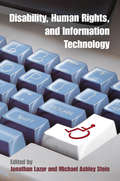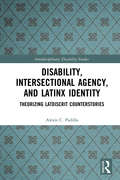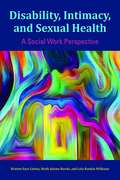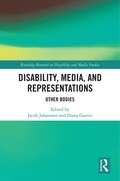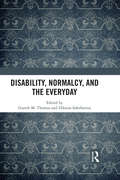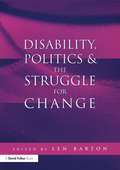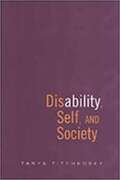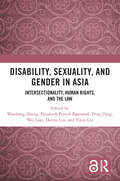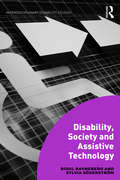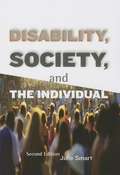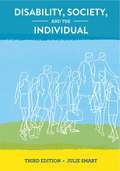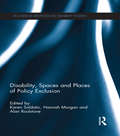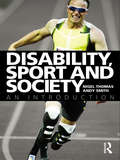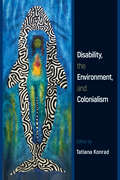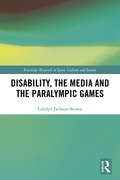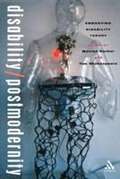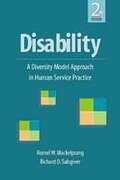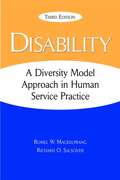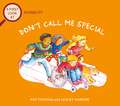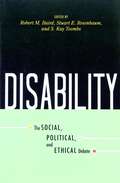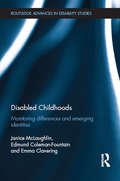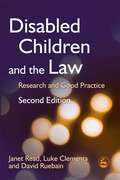- Table View
- List View
Disability, Human Rights, and Information Technology
by Michael Stein Jonathan LazarDisability, Human Rights, and Information Technology addresses the global issue of equal access to information and communications technology (ICT) by persons with disabilities. The right to access the same digital content at the same time and at the same cost as people without disabilities is implicit in several human rights instruments and is featured prominently in Articles 9 and 21 of the Convention on the Rights of Persons with Disabilities. <P><P>The right to access ICT, moreover, invokes complementary civil and human rights issues: freedom of expression; freedom to information; political participation; civic engagement; inclusive education; the right to access the highest level of scientific and technological information; and participation in social and cultural opportunities. <P><P>Despite the ready availability and minimal cost of technology to enable people with disabilities to access ICT on an equal footing as consumers without disabilities, prevailing practice around the globe continues to result in their exclusion. Questions and complexities may also arise where technologies advance ahead of existing laws and policies, where legal norms are established but not yet implemented, or where legal rights are defined but clear technical implementations are not yet established. <P><P>At the intersection of human-computer interaction, disability rights, civil rights, human rights, international development, and public policy, the volume's contributors examine crucial yet underexplored areas, including technology access for people with cognitive impairments, public financing of information technology, accessibility and e-learning, and human rights and social inclusion. <P><P>Contributors: John Bertot, Peter Blanck, Judy Brewer, Joyram Chakraborty, Tim Elder, Jim Fruchterman, G. Anthony Giannoumis, Paul Jaeger, Sanjay Jain, Deborah Kaplan, Raja Kushalnagar, Jonathan Lazar, Fredric I. Lederer, Janet E. Lord, Ravi Malhotra, Jorge Manhique, Mirriam Nthenge, Joyojeet Pal, Megan A. Rusciano, David Sloan, Michael Ashley Stein, Brian Wentz, Marco Winckler, Mary J. Ziegler.
Disability, Intersectional Agency, and Latinx Identity: Theorizing LatDisCrit Counterstories (Interdisciplinary Disability Studies)
by Alexis PadillaThis interdisciplinary volume links dis/ability and agency by exploring LatDisCrit’s theory and activist emancipatory practice. It uses the author’s experiential and analytical views as a blind brown Latinx engaged scholar and activist from the global south living and struggling in the highly racialized global north context of the United States. LatDisCrit integrates critically LatCrit and DisCrit which look at the interplay of race/ethnicity, diasporic cultures, historical sociopolitics and disability within multiple Latinx identities in mostly global north contexts, while incorporating global south epistemologies. Using intersectional analysis of key concepts through critical counterstories, following critical race theory methodological traditions, and engaging possible decoloniality treatments of material precarity and agency, this book emphasizes intersectionality’s complex underpinnings within and beyond Latinidades. Through a careful interplay of dis/ability identity and dis/ability rights/empowerment, the volume opens avenues for intersectional solidarity and spaces for radical transformational learning. This book will be of interest to all scholars and students working in disability studies; intersectional disability justice activists; critical Latinx/Chicanx studies; critical geographies; intersectional political philosophy; and political and public sociology.
Disability, Intimacy, and Sexual Health: A Social Work Perspective
by Kristen Faye Linton Heidi Adams Rueda Lela Rankin Williams"Sexuality is a key aspect of human development and identity, yet people with disabilities frequently encounter social and political barriers to achieving healthy, autonomous intimate relationships. Society tends to associate disability with asexuality and often labels sexual behaviors among people with disabilities as problematic or deviant. Faced with these assumptions and resultant policies, how can social workers meet the needs of this diverse population across the life course? In this book, Linton, Adams Rueda, and Rankin Williams compile comprehensive research and candid interviews with social workers to explore the complicated intersection of disability and sexuality. The book begins by detailing historical violations of the sexual and reproductive rights of people with disabilities, including forced castration and sterilization. It then explores current issues of sexuality and disability throughout the life course, starting with childhood and adolescence. The authors examine the increased risk of abuse and victimization that people with disabilities face while in romantic or sexual relationships and provide practice recommendations to help combat factors that contribute to this vulnerability. Other milestones across the life course are also explored, such as pregnancy and parenting, marriage and cohabitation, and intimacy in older adulthood. Throughout the book, the authors examine the micro, meso, and macro systems that affect the lives and relationships of people with disabilities. This book touches on psychiatric, intellectual, developmental, learning, neurological, and physical disabilities and gives voice to both practitioners and their clients. It's an unflinching look at the pressing challenges professionals can face while serving people with disabilities, essential for students, academics, policymakers, and practitioners in a variety of settings who wish to advocate for the full sexual citizenship of people with disabilities"--The publisher.
Disability, Media, and Representations: Other Bodies (Routledge Research in Disability and Media Studies)
by Jacob Johanssen Diana GarrisiBringing together scholars from around the world to research the intersection between media and disability, this edited collection aims to offer an interdisciplinary exploration and critique of print, broadcast and online representations of physical and mental impairments. Drawing on a wide range of case studies addressing how people can be ‘othered’ in contemporary media, the chapters focus on analyses of hateful discourses about disability on Reddit, news coverage of disability and education, media access of individuals with disabilities, the logic of memes and brain tumour on Twitter, celebrity and Down Syndrome on Instagram, disability in TV drama, the metaphor of disability for the nation; as well as an autoethnography of treatment of breast cancer. Providing a much-needed global perspective, Disability, Media, and Representations examines the relationship between self-representation and representations in either reinforcing or debunking myths around disability, and ways in which academic discourse can be differently articulated to study the relationship between media and disability. This book will be of interest to students and researchers of disability studies and media studies as well as activists and readers engaged in debates on diversity, inclusivity and the media.
Disability, Media, and Representations: Other Bodies (Routledge Research in Disability and Media Studies)
by Jacob Johanssen Diana GarrisiBringing together scholars from around the world to research the intersection between media and disability, this edited collection aims to offer an interdisciplinary exploration and critique of print, broadcast and online representations of physical and mental impairments.Drawing on a wide range of case studies addressing how people can be ‘othered’ in contemporary media, the chapters focus on analyses of hateful discourses about disability on Reddit, news coverage of disability and education, media access of individuals with disabilities, the logic of memes and brain tumour on Twitter, celebrity and Down Syndrome on Instagram, disability in TV drama, the metaphor of disability for the nation; as well as an autoethnography of treatment of breast cancer. Providing a much-needed global perspective, Disability, Media, and Representations examines the relationship between self-representation and representations in either reinforcing or debunking myths around disability, and ways in which academic discourse can be differently articulated to study the relationship between media and disability. This book will be of interest to students and researchers of disability studies and media studies as well as activists and readers engaged in debates on diversity, inclusivity and the media.
Disability, Normalcy, and the Everyday
by Dikaios Sakellariou Gareth M. ThomasMany critical analyses of disability address important ‘macro’ concerns, but are often far removed from an interactional and micro-level focus. Written by leading scholars in the field, and containing a range of theoretical and empirical contributions from around the world, this book focuses on the taken-for-granted, mundane human activities at the heart of how social life is reproduced, and how this impacts on the lives of those with a disability, family members, and other allies. It departs from earlier accounts by making sense of how disability is lived, mobilised, and enacted in everyday lives. Although broad in focus and navigating diverse social contexts, chapters are united by a concern with foregrounding micro, mundane moments for making sense of powerful discourses, practices, affects, relations, and world-making for disabled people and their allies. Using different examples – including learning disabilities, cerebral palsy, dementia, polio, and Parkinson’s disease – contributions move beyond a simplified narrow classification of disability which creates rigid categories of existence and denies bodily variation. Disability, Normalcy, and the Everyday should be considered essential reading for disability studies students and academics, as well as professionals involved in health and social care. With contributions located within new and familiar debates around embodiment, stigma, gender, identity, inequality, care, ethics, choice, materiality, youth, and representation, this book will be of interest to academics from different disciplinary backgrounds including sociology, anthropology, humanities, public health, allied health professions, science and technology studies, social work, and social policy.
Disability, Politics and the Struggle for Change
by Len BartonThis book seeks to explore how disability is understood and the position and experiences of disabled people both within and across different societies. The authors explore the question of politics in relation to specific struggles, providing a wealth of insights and ideas, and examine the nature and value of a social model of disability. They criticize exclusionary barriers while advancing a more democratic and participatory society based on principles of equality, offer cross-cultural insights and present stimuli for debate and further research. The text is accessible, topical, and provides new and innovatory thinking. This book will appeal to undergraduate and postgraduate students, lecturers and researchers with interests in education, social policy, sociology and disability studies.
Disability, Self, and Society
by Tanya TitchkoskyDisability, Self, and Society speaks with authenticity about disability as a process of identity formation within a culture that has done a great deal to de-emphasize the complexity of disability experience. <p><p> Unlike many who hold the conventional sociological view of disability as a 'lack' or stigmatized identity, Tanya Titchkosky approaches disability as an agentive (not passive) embodiment of liminality and as a demonstration of socially valuable in-between-ness. She argues that disability can and should be a 'teacher' to, and about, non-disabled or 'temporarily abled' society. <p><p> Titchkosky's poignant reflections on disability rely on the thought of Hannah Arendt as well as her personal experience as an individual with dyslexia living with a blind partner; she uniquely draws on her own and others' situations in order to demonstrate the sociopolitical character of disability. A thoughtful and cohesive integration of narrative and theory, Disability, Self, and Society presents a critical Canadian contribution to the growing subject of disability studies.
Disability, Sexuality, and Gender in Asia: Intersectionality, Human Rights, and the Law
by Wanhong Zhang, Elisabeth Perioli Bjørnstøl, Peng Ding, Wei Gao, Hanxu Liu and Yijun LiuThis book introduces experiential knowledge of the intersectionality of disability, sexuality, and gender equality issues. Scholars and disabled persons’ organizations in different Asian countries such as China, Vietnam, Myanmar, Nepal, and Japan have contributed to the book. It is a preliminary introduction of the frontline practice of Asian disability activism and the experience of women and LGBTIQ people with disabilities. It presents the direct participation of disability advocates in mapping how both women with disabilities and LGBTIQ individuals with disabilities realize their rights such as identity, work rights, personal safety, and sexual rights. Studies presented here explore the experience of empowering diverse disability groups and advocating for equality and non-discrimination. It explains how to use the leverage of the Convention on the Rights of Persons with Disabilities (CRPD) for further human rights campaigns in a broader context for disadvantaged groups. This collection is the product of a participatory research project, which aims to increase the capabilities of local disabled persons’ organizations and NGOs in utilizing human rights laws and encourage dialogue and collaboration between academia, people with disabilities, and human rights advocates. It will be essential reading for academics, researchers, policy-makers, and campaign groups.
Disability, Society and Assistive Technology (Interdisciplinary Disability Studies)
by Bodil Ravneberg Sylvia SöderströmThe provision of assistive technology is an important individual and collective service of the welfare state. The state plays a significant role towards linking users and products, and the matching of devices and users is both a science and an art. However, many people feel it is stigmatising to use individually designed assistive technologies as they often, in a subtle way, convey discriminating barriers in society. The major challenges of assistive technology are thus to reduce social exclusion and marginalisation and, importantly, to reduce individual risks and societal costs related to non-use due to deficiencies in usability, aesthetics and design of the technologies. This groundbreaking book discusses the relationships among society, disability and technology by using different empirical examples (e.g., school, everyday life) to show why the combination of disability studies and STS-studies (science, technology and society) is a fruitful approach to understanding and meeting these challenges. The book explores the significance of the technologies for users, society and the field; identifies challenges to designing, adopting and using assistive technologies; and points at theoretical challenges in research as well as professional challenges in assistive technology service provision. The book also scrutinises the role of assistive technology devices, as well as the organisational structure of the assistive technology market, in relation to disabled people’s lives. This book will be valuable reading for students, academics, teachers and social educators interested in Disability Studies, STS Studies, Product Design, Sociology, Occupational Therapy and Physiotherapy, as well as engineers working in the field of assistive technology.
Disability, Society and the Individual (2nd Edition)
by Julie SmartThe purpose of this book is to look at the disability experience from the perspective of the individual who has a disability, to discuss how disabilities are viewed by society, and to consider the relationship between these two viewpoints.
Disability, Society, and the Individual
by Julie SmartThis is a textbook in a graduate rehabilitation counseling program. It is for a class called psycho-social aspects of disability
Disability, Society, and the Individual
by Julie SmartThis unique book provides a comprehensive examination of the disability experience. The content focuses on definitions of disability, societal response to people with disabilities, and the experience of disability from the perspectives of individuals with disability. It is organized around broad themes rather than disability categories. With an engaging writing style and extensive and completely updated references, Disability, Society, and the Individual-Third Edition prepares the reader to understand and be able to use complex, important, and new ideas surrounding disability -- its experience and social and cultural context. The text includes discussion questions, learning activities, suggested readings, and first-person accounts. PART I--Definitions of Disability PART II--Society and Disability PART III--The Individual and Disability
Disability, Spaces and Places of Policy Exclusion (Routledge Advances in Disability Studies)
by Alan Roulstone Karen Soldatic Hannah MorganGeographies of disability have become a key research priority for many disability scholars and geographers. This edited collection, incorporating the work of leading international disability researchers, seeks to expand the current geographical frame operating within the realm of disability. Providing a critical and comprehensive examination of disability and spatial processes of exclusion and inclusion for disabled people, the book uniquely brings together insights from disability studies, spatial geographies and social policy with the purpose of exploring how spatial factors shape, limit or enhance policy towards, and the experiences of, disabled people. Divided into two parts, the first section explores the key concepts to have emerged within the field of disability geographies, and their relationship to new policy regimes. New and emerging concepts within the field are critically explored for their significance in conceptually framing disability. The second section provides an in-depth examination of disabled people’s experience of changing landscapes within the onset of emerging disability policy regimes. It deals with how the various actors and stakeholders, such as governments, social care agencies, families and disabled people traverse these landscapes under the new conditions laid out by changing policy regimes. Crucially, the chapters examine the lived meaning of changing spatial relations for disabled people. Grounded in recent empirical research, and with a global focus, each of the chapters reveal how social policy domains are challenged or undermined by the spatial realities faced by disabled people, and expands existing understandings of disability. In turn, the book supports readers to grasp future policy directions and processes that enable disabled people's choices, rights and participation. This important work will be invaluable reading for students and researchers involved in disability, geography and social policy.
Disability, Sport and Society: An Introduction
by Nigel Thomas Andy SmithDisability sport is a relatively recent phenomenon, yet it is also one that, particularly in the context of social inclusion, is attracting increasing political and academic interest. The purpose of this important new text – the first of its kind – is to introduce the reader to key concepts in disability and disability sport and to examine the complex relationships between modern sport, disability and other aspects of wider society. Drawing upon original data from interviews, surveys and policy documents, the book examines how disability sport has developed and is currently organised, and explores key themes, issues and concepts including: disability theory and policy the emergence and development of disability sport disability sport development in local authorities mainstreaming disability sport disability, physical education and school sport elite disability sport and the Paralympic Games disability sport and the media. Including chapter summaries, seminar questions and lists of key websites and further reading throughout, Sport, Disability and Society provides both an easy to follow introduction and a critical exploration of the key issues surrounding disability sport in the twenty-first century. This book is an invaluable resource for all students, researchers and professionals working in sport studies, disability studies, physical education, sociology and social policy. Nigel Thomas is Head of Sport and Exercise at Staffordshire University, UK, where his research focuses on the history, mainstreaming, and media coverage of disability sport. He previously worked for ten years with young disabled people as a sports development officer in local authorities and national governing bodies. Andy Smith is Lecturer in the Sociology of Sport and Exercise at the University of Chester, UK. He is a co-editor of the International Journal of Sport Policy, and a co-author of Sport Policy and Development: A Sociological Introduction, and An Introduction to Drugs in Sport: Addicted to Winning? Both books are published by Routledge (2009).
Disability, the Environment, and Colonialism
by Tatiana KonradDrawing on contemporary and historic literary and media examples of Western colonialism and Anglophone writings, Disability, the Environment, and Colonialism traces how the perverse nature of colonialism continues to dominate the globe today. The editor and contributors provide a careful analysis of the intersection of disability, the environment, and colonialism to understand issues such as eco-ableism, environmental degradation, homogenized approaches to environmentalism, and climate change. They also look at the body as a site of colonial oppression and environmental exploitation. Contributors: Holly Caldwell, Matthew J. C. Cella, John Gulledge, Memona Hossain, Nancy J. Hirschmann, Iain Hutchison, Andrew B. Jenks, Suha Kudsieh, Gordon M. Sayre, Jessica A. Schwartz, Anna Stenning, Aubrey Tang, Alice Wexler, and the editor.
Disability, the Media and the Paralympic Games (Routledge Research in Sport, Culture and Society)
by Carolyn Jackson-BrownThis book focuses on the ground-breaking coverage of the London 2012 Paralympic Games by the UK’s publicly owned but commercially funded Channel 4 network, coverage which seemed to deliver a transformational shift in attitudes towards people with disabilities. It sheds important new light on our understanding of media production and its complex interactions with sport and wider society. Drawing on political economy and cultural studies, the book explores why and how a marginalised group was brought into the mainstream by the media, and the key influencing factors and decision-making processes. Featuring interviews with key people involved in the television and digital production structures, as well as organisational archives, it helps us to understand the interplay between creativity and commerce, between editorial and marketing workflows, and about the making of meaning. The book also looks at coverage of the Rio Paralympics, and ahead to the Tokyo Games, and at changing global perceptions of disability through sport. This is fascinating reading for any advanced students, researchers, or sport management or media professionals looking to better understand the media production process or the significance of sport and disability in wider society.
Disability-Specific Hassles: The Effects of Oppression on People with Disabilities
by Robin TimmThis study explored the nature of disability-specific stressors encountered by people with disabilities (PWD), examined the relationship between these unique events and psychological well-being, and determined the role that disability identity plays in the experience of stress. People with disabilities encounter many stressors comparable to those experienced by other minority groups including stigma, prejudice, and discrimination (Olkin. 1999). However, well-researched measures of stressful events have poorly captured the types of unique stressors experienced by PWD (Thoits, 1991). Therefore, this study developed a new measure, the Disability-Specific Hassles Scale(DSHS) to aid in identifying stressors and examining their impact on psychological well-being.
Disability/Postmodernity: Embodying Disability Theory
by Tom Shakespeare Mairian CorkerWith contributions from leading scholars in the USA, Canada, the UK, Switzerland, Japan, India, Australia and Jordan, Disability and Postmodernity is the first book to study disability within the context of the "postmodern" world of the twenty-first century. Organized into three sections, the volume opens with an exploration of theoretical perspectives, looking especially at phenomenology, at the body, and at concepts of difference and identity. The second section deals with culture, discussing aesthetics, narrative, film, architecture and design, while the final section explores social practice, including chapters on disabled childrens' perspectives, sexual identity and "madness and mental distress". <p><p> The collection creates a bridge between social science perspectives on disability (predominant in disability studies in the UK for example) and humanities perspectives (which dominate the US approach). The authors aim to demystify the concept of postmodernity and to suggest ways in which it fosters a holistic approach to the study of disability that better represents and reflects the complexity of disabled people's experience. This is a unique and important contribution to both disability studies and social and cultural theory.
Disability: A Diversity Model Approach in Human Service Practice (Second Edition)
by Romel Mackelprang Richard SalsgiverThis comprehensive text fills a huge void in the field! Romel W. Mackelprang and Richard O. Salsgiver introduce an empowerment approach to working with persons with disabilities -- a direction that lights the way for human service workers and provides clients with greater independence and resilience. The authors are ardent in their desire to empower persons with disabilities by building on their strengths. This comprehensive book features a ground-breaking, strengths-based approach that fills a void in the available material on this topic, and thoroughly prepares helpers to work successfully with persons who have disabilities.
Disability: A Diversity Model Approach in Human Service Practice,Third Edition
by Romel W. Mackelprang Richard O. SalsgiverThe authors address policy, theory, description, and practice, stressing the difference of disability rather than the dysfunction of disability. The text is illustrated with in-depth personal narratives by those living with disability and thought-provoking sidebars that ask readers to consider the implications of their own reactions to disability. The book establishes the historical and societal context in which those with disabilities are marginalized, discusses the major groupings of disabilities, and finally offers a model for assessment and practice that human service practitioners can adopt. It develops a contemporary perspective in which people with disabilities are considered valuable and contributing members of society.
Disability: Don't Call Me Special (A First Look At #6)
by Pat ThomasThis updated edition of this 20-year-old bestselling title, with consultants from Mencap, enables parents to help their children explore questons about concerns about disability in a simple and reassuring way. It challenges the stereotypes that are often formed during childhood. Notes for parents and teachers at the back of the book provide valuable advice for how to share this book with your child or class. Written by a trained psychotherapist, journalist and parent, and illustrated by an experienced children's book artist, this title is part of an acclaimed and successful series of picture-book non-fiction for Early Years. Books in the series give advice and promote interaction between children, parents, and teachers on a wide variety of personal, social and emotional issues. They are excellent tools for teachers to use during classroom discussions.
Disability: The Social, Political, and Ethical Debate
by Robert M. Baird Stuart E. Rosenbaum S. Kay ToombsWhat is it like to experience disability? What are the prevailing cultural attitudes toward those who experience disability? How do social norms and public policies affect those experiencing disability? This book provides a vivid and concrete introduction to the wealth of social, political, and ethical debates that surround the disabled. Beginning with an exploration of the perspective of persons with disabilities, the essays demonstrate the extent to which the disability experience is affected by social and cultural values, attitudes, and policies. In addition to these first-person reflections, there are essays relating to such issues as: The disability rights movement; Disability studies; Social policy relating to disability; Physician-assisted suicide; genetic testing; selective abortion; the moral status of handicapped new-borns; living and dying with dignity. Written in an engaging style with a focus on the concrete, this collection of essays includes contributions by John Hockenberry, Charles Krauthammer, Peter Singer, and others. It is a marvellous resource for enabling the reader to comprehend the experience of disability and to explore contemporary issues involving the disability community.
Disabled Childhoods: Monitoring Differences and Emerging Identities (Routledge Advances in Disability Studies)
by Edmund Coleman-Fountain Janice McLaughlin Emma ClaveringA crucial contemporary dynamic around children and young people in the Global North is the multiple ways that have emerged to monitor their development, behaviour and character. In particular disabled children or children with unusual developmental patterns can find themselves surrounded by multiple practices through which they are examined. This rich book draws on a wide range of qualitative research to look at how disabled children have been cared for, treated and categorised. Narrative and longitudinal interviews with children and their families, along with stories and images they have produced and notes from observations of different spaces in their lives – medical consultation rooms, cafes and leisure centres, homes, classrooms and playgrounds amongst others – all make a contribution. Bringing this wealth of empirical data together with conceptual ideas from disability studies, sociology of the body, childhood studies, symbolic interactionism and feminist critical theory, the authors explore the multiple ways in which monitoring occurs within childhood disability and its social effects. Their discussion includes examining the dynamics of differentiation via medicine, social interaction, and embodiment and the multiple actors – including children and young people themselves – involved. The book also investigates the practices that differentiate children into different categories and what this means for notions of normality, integration, belonging and citizenship. Scrutinising the multiple forms of monitoring around disabled children and the consequences they generate for how we think about childhood and what is ‘normal’, this volume sits at the intersection of disability studies and childhood studies.
Disabled Children and the Law: Research and Good Practice Second Edition
by David Ruebain Janet Read Luke ClementsNow in its completely updated second edition, this accessible guide provides essential information about how the law can be used to promote good practice and policy development for disabled children and young people. The authors take an anti-discriminatory and inclusive approach that involves parents and children in decision-making and advocacy. They summarise recent research on common needs and problems of disabled children, young adults and their families, and what support services are valued by them. Individual chapters cover issues affecting children at different stages in the lifecourse, including receiving diagnosis, ensuring educational and social inclusion, and establishing autonomy and independence in early adulthood. The overlapping legal responsibilities of social services, health and education are explained and changes arising from the Children Act 2004 are highlighted. Disabled Children and the Law is an essential reference for practitioners, policy makers, students and families.
